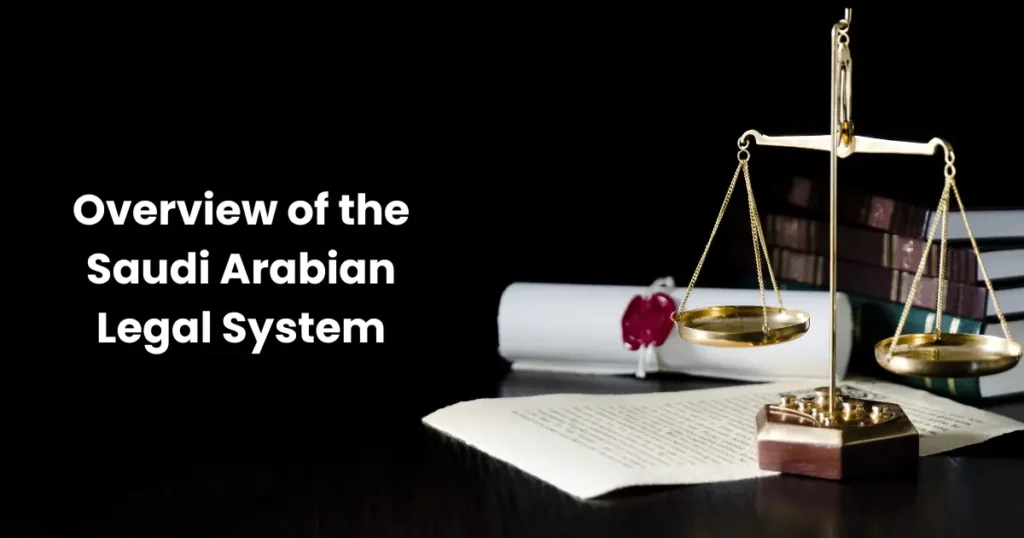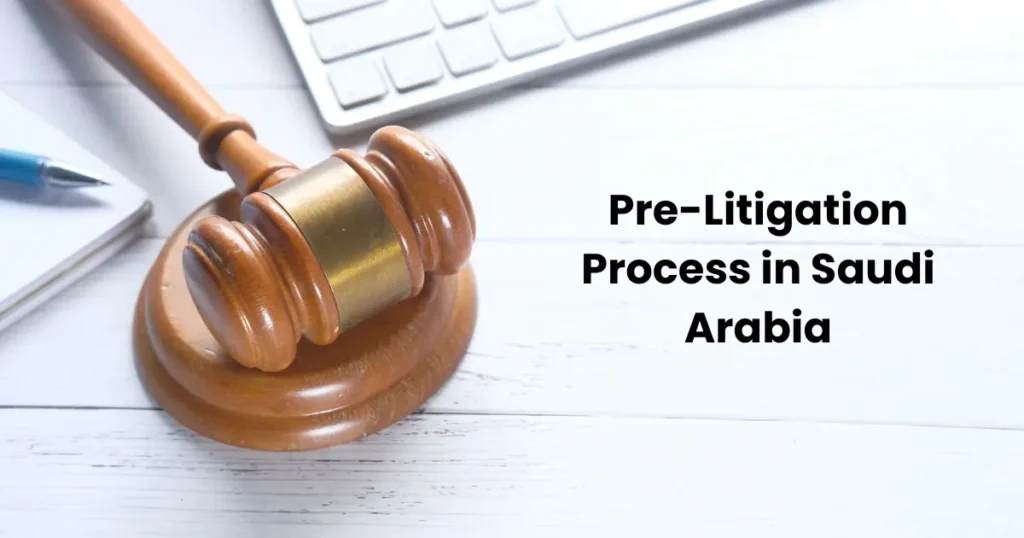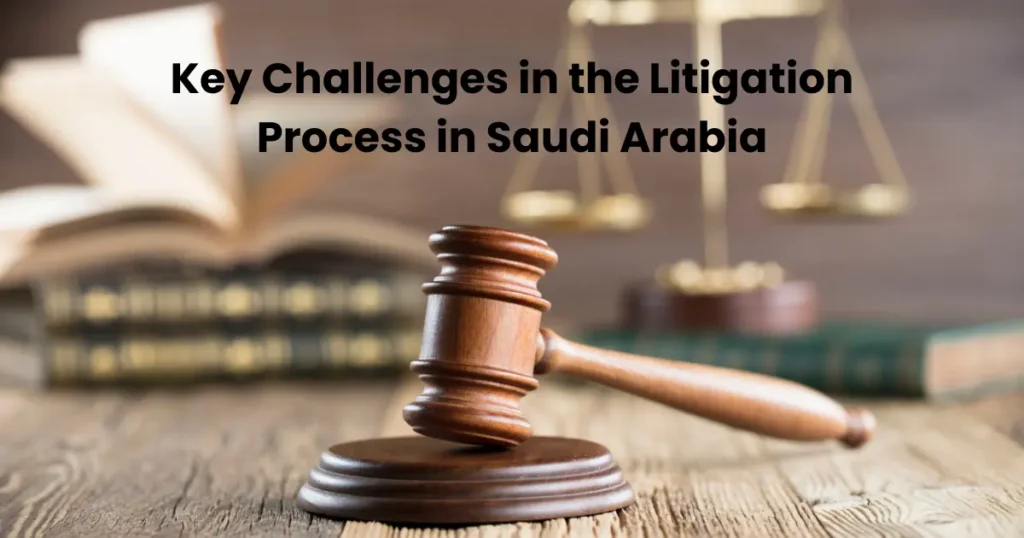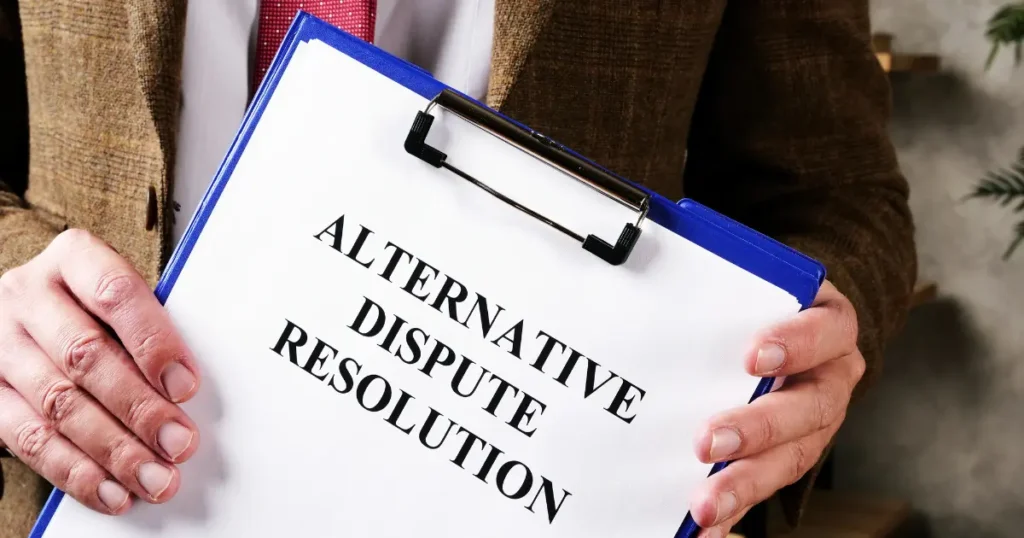Litigation Process in Saudi Arabia: Ultimate Guide to Commercial Litigation and Its Procedures in Courts (2025)
The litigation process in Saudi Arabia is a structured and comprehensive procedure grounded in Islamic Sharia principles, which serve as the foundation of the country’s legal system. As one of the most prominent legal jurisdictions in the Middle East, Saudi Arabia has a unique legal framework that blends religious and statutory laws. Understanding this framework is essential for anyone involved in a dispute, whether they are individuals, businesses, or foreign investors.
Navigating the litigation process in Saudi Arabia can be complex due to strict adherence to local customs, procedural rules, and language requirements. Whether you are pursuing a civil, commercial, or criminal case, it is crucial to approach the process with expert legal guidance. This article will explore the key steps of the litigation process in Saudi Arabia, offering insights into the legal structure, pre-litigation requirements, and court proceedings.
For those seeking professional assistance, the Dr Abdulrahman Baamir Law Firm provides unparalleled legal expertise, ensuring a seamless litigation experience tailored to your needs. With years of experience handling complex cases, our firm is your trusted partner in achieving legal success.
Overview of the Saudi Arabian Legal System
The Saudi Arabian legal system is rooted in Islamic Sharia law, making it distinct from most legal frameworks around the world. This system is derived from the Quran and the Sunnah (teachings and practices of the Prophet Muhammad, peace be upon him), ensuring that laws align with Islamic principles. While Sharia law forms the core, Saudi Arabia has also established regulatory laws to address modern needs, particularly in areas like commerce, labor, and investment.

Sharia Law as the Foundation
Islamic Sharia law governs most aspects of life in Saudi Arabia, including civil, criminal, and family law matters. The interpretation of Sharia is carried out by Islamic scholars (Ulema) and judges, who use principles of fiqh (Islamic jurisprudence) to decide cases. This framework ensures that justice adheres to moral and ethical standards defined by Islam.
Court Structure in Saudi Arabia
The litigation process in Saudi Arabia operates within a hierarchical court system, which includes:
- General Courts: Handle civil and criminal cases, such as family disputes, contract breaches, and property conflicts.
- Commercial Courts: Focus on business-related disputes, such as those involving contracts, corporate law, and bankruptcy cases.
- Administrative Courts (Board of Grievances): Deal with cases involving government entities, including disputes over public contracts or decisions by administrative bodies.
- Labor Courts: Address employer-employee disputes, including termination, wages, and workplace rights.
- Appeals Courts: Review cases from lower courts to ensure the proper application of law.
- Supreme Court: The highest authority, responsible for ensuring consistency in the interpretation and application of laws across the kingdom.
Modern Legal Developments
In recent years, Saudi Arabia has introduced reforms to modernize its legal system. For instance, the introduction of commercial courts and arbitration frameworks has made the litigation process more efficient, particularly for businesses. These advancements aim to attract foreign investment and promote economic diversification under Vision 2030.
The Saudi Arabian legal system balances tradition with modernity, providing a robust framework for resolving disputes. Understanding its intricacies is key to successfully navigating the litigation process in Saudi Arabia, particularly with the guidance of experienced legal professionals.
For comprehensive legal assistance, consider partnering with the Dr Abdulrahman Baamir Law Firm, where our expertise ensures your interests are represented with precision and dedication.
Pre-Litigation Process in Saudi Arabia
The litigation process in Saudi Arabia begins with essential pre-litigation steps designed to encourage reconciliation and streamline dispute resolution. These preliminary actions are critical, as they not only prepare the case for court proceedings but also offer parties opportunities to resolve their disputes without entering formal litigation.

1. Filing a Complaint
The first step in the pre-litigation process is filing a complaint. The aggrieved party submits their grievance to the relevant authority, which could be the court or a specialized body, depending on the nature of the dispute (e.g., labor, commercial, or administrative). The complaint must be clear, well-documented, and aligned with the procedural requirements set by Saudi law.
- Essential Documents: The complainant must provide identification, contracts, correspondence, and any other evidence supporting their claim.
- Registration: Complaints are typically filed through Saudi Arabia’s online legal portal, Najiz, which simplifies submission and tracking.
2. Mediation and Reconciliation
Before proceeding to court, many cases require an attempt at reconciliation or mediation. This is in line with Islamic principles that encourage amicable dispute resolution.
- Reconciliation Committees: For family disputes, commercial conflicts, and labor disagreements, reconciliation committees often mediate between the parties to reach a mutually agreeable solution.
- Mandatory Mediation: In some cases, mediation is a mandatory step before litigation, such as in labor disputes or disputes involving small business contracts.
3. Preparing the Case for Litigation
If reconciliation fails, the case proceeds toward formal litigation. During this stage, the parties must ensure their case is well-prepared by:
- Collecting evidence and witnesses.
- Drafting a legal memorandum outlining the claim or defense.
- Reviewing applicable laws and regulations.
4. Legal Representation
Hiring skilled legal counsel is crucial during the pre-litigation process. Experienced lawyers, such as those at the Dr Abdulrahman Baamir Law Firm, can guide clients through documentation, legal requirements, and strategic preparations, ensuring a strong foundation for the case.
Why Pre-Litigation is Critical
The pre-litigation process in Saudi Arabia is more than a procedural formality; it plays a vital role in achieving justice efficiently. Successful reconciliation saves time, money, and emotional strain, while thorough preparation ensures that cases presented in court are well-supported.
Navigating these pre-litigation steps requires an in-depth understanding of local laws and procedures. For seamless guidance and expert representation, trust the Dr Abdulrahman Baamir Law Firm, renowned for its dedication to client success throughout the litigation process in Saudi Arabia.
Litigation Process in Saudi Arabia
The litigation process in Saudi Arabia is a structured procedure governed by Islamic Sharia principles and modern legal frameworks. It is designed to ensure justice, transparency, and adherence to ethical and legal standards. Understanding this process is essential for anyone seeking resolution in Saudi courts, whether for civil, criminal, or commercial disputes.

1. Submitting the Case to Court
The litigation process begins with the plaintiff submitting a case to the appropriate court. This step involves:
- Filing a Lawsuit: The plaintiff files the lawsuit through the Najiz Portal, an official platform for judicial services.
- Court Jurisdiction: Cases are submitted to specialized courts based on the nature of the dispute (e.g., General, Commercial, Labor, or Administrative Courts).
- Initial Review: The court reviews the case to ensure compliance with procedural requirements before scheduling hearings.
2. Legal Representation and Roles
Legal representation is not mandatory but highly recommended. Lawyers play a critical role in drafting legal memorandums, presenting arguments, and interpreting the law. In Saudi Arabia, both parties may represent themselves or hire attorneys.
- For expert legal counsel, the Dr Abdulrahman Baamir Law Firm offers tailored services to navigate the complexities of litigation.
3. Initial Hearings
Once the case is accepted, initial hearings are scheduled:
- Case Registration: The plaintiff’s statement is registered, and the defendant is notified of the lawsuit.
- Defense Submission: The defendant submits their written defense, which may challenge the plaintiff’s claims or provide counterarguments.
- Preliminary Rulings: If necessary, the court may issue temporary orders, such as freezing assets or preserving evidence.
4. Evidence Presentation
Evidence plays a vital role in the litigation process in Saudi Arabia, and the courts rely on clear documentation and witness testimony to make judgments.
- Types of Evidence: Documents, contracts, correspondence, expert opinions, and witness statements.
- Verification: The court thoroughly examines the validity of evidence, ensuring it complies with Saudi law and Sharia principles.
5. Court Proceedings and Judgment
The litigation process proceeds in phases, with judges presiding over hearings:
- Trial Phase: Both parties present their arguments, evidence, and witnesses. Judges may ask questions to clarify details.
- Ruling: After reviewing the case, the judge issues a verdict based on Sharia law and applicable regulations.
6. Role of Appeals
Saudi Arabia allows appeals to ensure fairness and correctness in rulings:
- Court of Appeals: Parties dissatisfied with the verdict may file an appeal, which will be reviewed for legal and procedural accuracy.
- Supreme Court: For specific cases, the Supreme Court reviews decisions to ensure consistency in Sharia interpretation and legal application.
7. Enforcement of Judgments
Once a final verdict is issued, it must be enforced. The Enforcement Court oversees the implementation of judgments, ensuring that court orders are carried out effectively.
Why Legal Expertise is Essential
The litigation process in Saudi Arabia can be complex, requiring a thorough understanding of Sharia principles, procedural rules, and modern legal practices. Missteps in filing, evidence preparation, or procedural compliance can significantly impact the outcome of a case.
For seamless navigation through the litigation process, trust the Dr Abdulrahman Baamir Law Firm, a leader in providing expert legal counsel tailored to your needs. Our deep understanding of Saudi law ensures your case is handled with precision, professionalism, and dedication to achieving the best possible outcome.
Court Proceedings in Saudi Arabia
Court proceedings in Saudi Arabia are a formalized process aimed at ensuring justice and fairness while adhering to Islamic Sharia principles and the country’s statutory laws. The procedural stages are meticulously designed to evaluate evidence, hear arguments, and deliver judgments that uphold the rule of law.

1. Trial Phases
The trial phase in the litigation process in Saudi Arabia is divided into clear stages, providing each party with an opportunity to present their case:
- Opening Statements: Both the plaintiff and defendant present their initial arguments. This includes outlining the nature of the dispute, claims, and counterclaims.
- Submission of Evidence: The plaintiff submits all relevant documents, contracts, or witness testimonies to substantiate their claims. The defendant follows with their evidence to counter the plaintiff’s assertions.
- Questioning and Examination: The judge may question both parties and their witnesses to clarify details or verify facts. Expert testimony may also be sought if the case involves technical matters.
2. Role of Judges
In Saudi Arabia, judges hold significant authority in overseeing the proceedings. Their responsibilities include:
- Interpreting and applying Sharia principles to the case.
- Examining evidence and witness credibility.
- Ensuring procedural compliance by both parties.
Unlike some legal systems, there are no jury trials; judges alone render decisions based on Sharia law and statutory regulations.
3. Presentation of Arguments
Both parties have opportunities to present their arguments in writing and orally during hearings.
- Legal Memorandums: Written submissions detailing legal arguments, evidence, and applicable laws are crucial.
- Oral Advocacy: Lawyers or the parties themselves can elaborate on their points, emphasizing key aspects of their case.
4. Judgment Issuance
After the hearings conclude, the judge reviews the evidence and arguments presented before issuing a judgment.
- Rulings Based on Sharia Law: Decisions are made in accordance with Sharia principles and any applicable statutory laws.
- Timeline for Judgment: While judgments are issued promptly, complex cases may require additional time for deliberation.
5. Appeals Process
If either party disagrees with the court’s judgment, they can file an appeal:
- Appeals Court: Reviews the case for errors in law or procedure.
- Supreme Court: The highest authority that ensures consistent application of Islamic principles and legal standards.
6. Enforcement of Judgments
Once the ruling is finalized, it must be enforced. The Enforcement Court is responsible for ensuring compliance with court orders, such as financial settlements, property transfers, or other obligations.
Key Considerations in Court Proceedings
Navigating court proceedings in Saudi Arabia requires thorough preparation and compliance with legal procedures. Here are some tips:
- Ensure Proper Documentation: All evidence must meet the requirements of Saudi courts.
- Hire Experienced Legal Counsel: Skilled lawyers, such as those at the Dr Abdulrahman Baamir Law Firm, are essential for presenting a strong case.
- Understand the Legal Framework: Familiarity with both Sharia law and statutory regulations is critical for success.
The litigation process in Saudi Arabia, including court proceedings, emphasizes fairness, transparency, and adherence to Islamic principles. With the support of experienced legal professionals, individuals and businesses can navigate this process confidently.
For comprehensive legal representation and expert advice, trust the Dr Abdul Rahman Baamir Law Firm, a leading name in Saudi legal services. Our team ensures that your case is handled with precision, professionalism, and dedication to achieving favorable outcomes.
Key Challenges in the Litigation Process in Saudi Arabia
The litigation process in Saudi Arabia is well-structured and rooted in Sharia principles, but it presents unique challenges for litigants. These challenges arise due to the interplay of legal traditions, procedural complexities, and modern regulatory frameworks. Understanding these hurdles is essential for anyone navigating the Saudi judicial system.

1. Adherence to Sharia Law
Saudi Arabia’s judicial system is based on Islamic Sharia, which governs all legal rulings. While this ensures justice is delivered in line with Islamic principles, it can also pose challenges:
- Interpretation Variability: Judges have discretionary power in interpreting Sharia, which may result in differing judgments for similar cases.
- Non-Codified Nature: Some areas of Sharia law lack codification, creating uncertainty in how certain disputes will be resolved.
2. Procedural Complexities
The judicial process involves strict procedural requirements that litigants must follow meticulously:
- Documentation Requirements: The courts demand comprehensive and verified documentation, which can be difficult for foreign businesses or individuals unfamiliar with local practices.
- Language Barriers: All legal proceedings are conducted in Arabic, requiring accurate translations and interpretation for non-Arabic speakers.
3. Lengthy Timelines
While the Saudi legal system emphasizes efficiency, delays can occur:
- Backlog of Cases: High case volumes in certain courts, especially commercial and labor courts, can lead to delays in scheduling hearings and delivering verdicts.
- Appeals Process: The multi-tiered system for appeals can extend the litigation timeline significantly.
4. Cultural and Legal Differences for Foreign Parties
Foreign entities and individuals may face additional challenges due to unfamiliarity with the Saudi legal and cultural context:
- Legal Framework Differences: Foreign businesses may struggle to navigate a system rooted in Sharia law, which differs significantly from Western legal systems.
- Representation Issues: Non-Saudis must hire licensed Saudi lawyers, as only they are permitted to represent clients in court.
5. Enforcement of Judgments
Even after a favorable court ruling, enforcing the judgment can be challenging:
- Non-Compliance by Defendants: Defendants may delay compliance with court orders, requiring additional enforcement actions.
- Asset Recovery: Locating and liquidating assets, especially for foreign entities, can be a complex process.
6. Mediation and Reconciliation Expectations
Saudi courts emphasize reconciliation before litigation, which, while beneficial, may delay the process if parties cannot agree:
- Mandatory Mediation: Some cases require attempts at mediation or reconciliation, which may prolong the resolution of disputes.
- Cultural Norms: Foreign litigants may find it challenging to navigate these culturally significant practices.
How to Overcome These Challenges
1. Seek Expert Legal Representation
Hiring experienced legal professionals who understand the intricacies of Saudi law is crucial. The Dr Abdulrahman Baamir Law Firm specializes in providing tailored legal services, ensuring smooth navigation through the litigation process.
2. Prioritize Thorough Preparation
Ensure that all documentation, contracts, and evidence are accurate, complete, and aligned with Saudi legal requirements.
3. Leverage Mediation Effectively
Use mediation and reconciliation opportunities to resolve disputes quickly and cost-effectively.
4. Stay Informed of Legal Updates
Regularly consult legal experts to stay updated on changes in Saudi Arabia’s regulatory and judicial frameworks.
The litigation process in Saudi Arabia has its challenges, but with proper preparation and expert legal guidance, these hurdles can be effectively managed. For personalized assistance, trust the Dr Abdulrahman Baamir Law Firm, a leading provider of legal solutions that ensure your case is handled with professionalism and precision.
Alternative Dispute Resolution (ADR) in Saudi Arabia
Alternative Dispute Resolution (ADR) has become a preferred method for resolving disputes in Saudi Arabia, offering faster, more cost-effective, and confidential alternatives to traditional court litigation. Rooted in both Sharia principles and modern practices, ADR mechanisms provide flexibility while maintaining compliance with Islamic law.

1. Key ADR Methods in Saudi Arabia
- Arbitration
Arbitration is a widely used ADR method, especially for commercial disputes. It involves referring the matter to an impartial arbitrator or arbitration panel, whose decision is binding.- Legal Framework: Governed by the Saudi Arbitration Law of 2012, which aligns with international standards such as the UNCITRAL Model Law.
- Saudi Center for Commercial Arbitration (SCCA): A prominent institution offering arbitration services with experienced arbitrators and streamlined processes.
- Benefits:
- Confidentiality of proceedings.
- Enforcement of awards under the New York Convention, to which Saudi Arabia is a signatory.
- Mediation
Mediation involves a neutral third party assisting disputing parties in reaching a mutually acceptable agreement. It is particularly effective in family, commercial, and labor disputes.- Key Features:
- Voluntary participation by both parties.
- The mediator does not impose a decision but facilitates negotiations.
- Agreements reached are formalized and may be enforced by the court.
- Advantages:
- Preserves relationships between disputing parties.
- Quicker resolution compared to litigation.
- Key Features:
- Conciliation
Conciliation is similar to mediation but involves a conciliator who may suggest possible solutions to resolve the dispute.- Common Applications: Family disputes, debt recovery, and labor issues.
- Court Integration: Courts in Saudi Arabia often require conciliation efforts before proceeding with litigation.
- Reconciliation Committees
Reconciliation committees operate under the Ministry of Justice and aim to settle disputes amicably. These committees are instrumental in cases involving family law, minor civil disputes, and community issues.
2. Advantages of ADR in Saudi Arabia
- Cost-Effectiveness: ADR methods are generally less expensive than litigation.
- Time Efficiency: Cases are resolved more quickly, avoiding lengthy court processes.
- Confidentiality: ADR ensures privacy, which is particularly valued in commercial and family disputes.
- Flexibility: Parties can agree on procedures, venues, and the selection of arbitrators or mediators.
- Enforcement: Arbitration awards are enforceable under the Saudi Enforcement Law and the New York Convention.
3. Challenges in ADR Implementation
- Cultural Barriers: While ADR is growing in popularity, some parties prefer traditional court proceedings due to cultural norms and perceptions of legitimacy.
- Limited Awareness: Many businesses and individuals are unaware of the benefits and availability of ADR mechanisms.
- Enforcement Issues: Though arbitration awards are enforceable, challenges may arise if a party resists compliance.
4. ADR and Saudi Vision 2030
Saudi Arabia’s Vision 2030 emphasizes ADR as part of its judicial reforms to improve the business environment and attract foreign investment. Initiatives include:
- Expansion of SCCA: Enhancing ADR accessibility and reliability for domestic and international disputes.
- Judicial Training: Educating judges and legal professionals on ADR practices.
- Integration with Courts: Encouraging mandatory mediation and conciliation before litigation.
Why Choose ADR?
ADR is particularly beneficial for businesses and individuals seeking efficient and amicable dispute resolution. With the growing importance of arbitration and mediation, having skilled legal guidance is essential for navigating these processes effectively.
For expert advice and representation in ADR matters, trust the Dr Abdulrahman Baamir Law Firm, a leader in providing innovative legal solutions. Our team ensures that your dispute is resolved efficiently while safeguarding your interests and maintaining compliance with Saudi laws.
Conclusion
The litigation process in Saudi Arabia is a reflection of the country’s commitment to justice and its adherence to Sharia principles. While the system is well-structured, it comes with unique challenges such as procedural complexities, language barriers, and the need for cultural understanding. However, with the right preparation, legal expertise, and awareness of alternative dispute resolution methods, litigants can effectively navigate these challenges. Whether through court proceedings or ADR mechanisms like arbitration and mediation, Saudi Arabia offers robust frameworks to ensure fair and timely dispute resolution.
For individuals and businesses seeking professional guidance, the Dr Abdulrahman Baamir Law Firm stands as a trusted partner in navigating the complexities of the Saudi legal system. With extensive experience in litigation, ADR, and legal consultancy, we are dedicated to protecting your interests and achieving the best possible outcomes for your case. Our team’s expertise and personalized approach make us the ideal choice for resolving disputes in Saudi Arabia. Contact us today for unparalleled legal services tailored to your needs.
